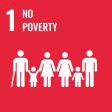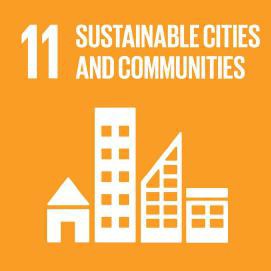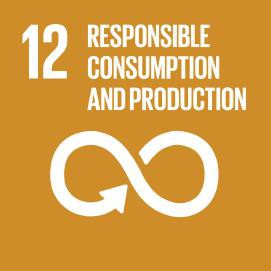Our Mission
Helping the world’s biggest companies, solve the world’s biggest problems, powered by 12 million startups.
“We exist to connect the dots and forge partnerships, solving corporate challenges with impactful startup solutions” – Jeremy Basset, CEO.
At Co:cubed, we are passionate about the role that innovation and partnerships with startups can play in helping corporates achieve their sustainability ambitions and in turn having an impact on the UN’s Sustainable Development Goals. At Co:cubed, we have seen the positive impact that these collaborations can have on some of the world’s most pressing challenges. By leveraging the agility, expertise, and innovation of startups, corporates can not only advance their own sustainability efforts, but also help shape the corporate landscape of the future.
In this short report, our scouts have highlighted 17 startups from our network of 12 million startups who are addressing the 17 UN SDGs.
We also showcase some of the innovation challenges our clients faced which lead them to approach Co:cubed, as well as the startups we enabled a partnership with, delivering transformational impact for both the client and the startups scaling through the collaboration.
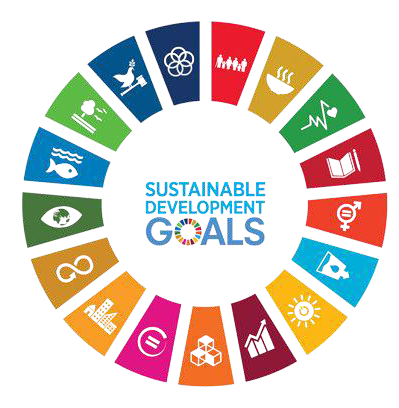 Going back to basics, feel free to skip past if you’re already up to speed with all things SDGs…
The 2020 Agenda for Sustainable Development adopted by all United Nations Member States in 2015, provides a shared blueprint for peace and prosperity for people and the planet, now and into the future. At its heart the 17 Sustainable Development Goals (SDGs) are an urgent call for action by all countries – developed and developing – in a global partnership. They recognise that ending poverty and other deprivations must go
hand-in-hand with strategies that improve health and education, reduce inequality, and spur economic growth – all while tackling climate change and working to preserve our oceans and forests. The SDGs build on decades of work by countries and the UN, including the UN Department of Economic and Social Affairs.
Going back to basics, feel free to skip past if you’re already up to speed with all things SDGs…
The 2020 Agenda for Sustainable Development adopted by all United Nations Member States in 2015, provides a shared blueprint for peace and prosperity for people and the planet, now and into the future. At its heart the 17 Sustainable Development Goals (SDGs) are an urgent call for action by all countries – developed and developing – in a global partnership. They recognise that ending poverty and other deprivations must go
hand-in-hand with strategies that improve health and education, reduce inequality, and spur economic growth – all while tackling climate change and working to preserve our oceans and forests. The SDGs build on decades of work by countries and the UN, including the UN Department of Economic and Social Affairs.
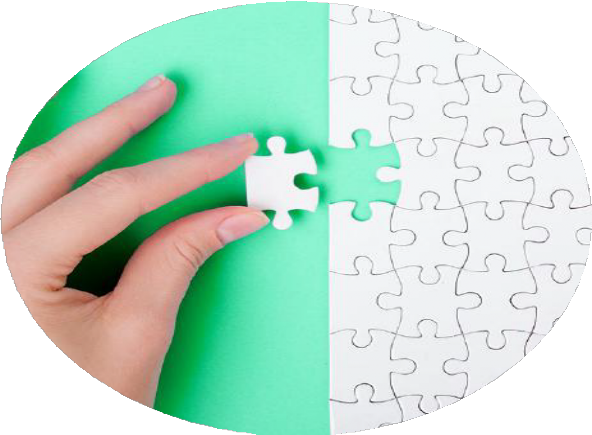
More than 700 million, or 10 percent of the world population, still live in extreme poverty today, struggling to fulfil the most basic needs like health, education, and access to water and sanitation, to name a few. The majority of people living on less than $1.90 a day live in sub-Saharan Africa. Worldwide, the poverty rate in rural areas.
For those who work, having a job does not guarantee a decent living. In fact, 8 percent of employed workers and their families worldwide lived in extreme poverty in 2018.
One out of five children live in extreme poverty. Ensuring social protection for all children and other vulnerable groups is critical to reduce poverty.

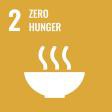 The world is not on track to achieve Zero Hunger by 2030. If recent trends continue, the number of people affected by hunger will surpass 840 million by 2030. With more than a quarter of a billion people on the brink of starvation, swift action must be taken to provide food and humanitarian relief to the most at-risk regions.
At the same time, a profound change of the global food and agriculture system is needed if we are to nourish the more than 690 million people who are hungry today. Increasing agricultural productivity and sustainable food production are crucial to help alleviate the perils of hunger.
The world is not on track to achieve Zero Hunger by 2030. If recent trends continue, the number of people affected by hunger will surpass 840 million by 2030. With more than a quarter of a billion people on the brink of starvation, swift action must be taken to provide food and humanitarian relief to the most at-risk regions.
At the same time, a profound change of the global food and agriculture system is needed if we are to nourish the more than 690 million people who are hungry today. Increasing agricultural productivity and sustainable food production are crucial to help alleviate the perils of hunger.
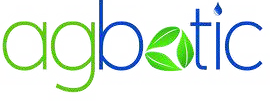 US-based startup Agbotic develops technology for smart farms. The startup’s SmartFarm platform combines ecology and technology to enable resilient and sustainable farming. It promotes regenerative farming by strategic tree planting, crop rotation, carbon sequestration, and habitat restoration. The startup also utilizes automation and advanced analytics to enable improvements in crop quality and yield while minimizing resource use.
https://www.agbotic.com/smartfarm
US-based startup Agbotic develops technology for smart farms. The startup’s SmartFarm platform combines ecology and technology to enable resilient and sustainable farming. It promotes regenerative farming by strategic tree planting, crop rotation, carbon sequestration, and habitat restoration. The startup also utilizes automation and advanced analytics to enable improvements in crop quality and yield while minimizing resource use.
https://www.agbotic.com/smartfarm
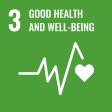 Before the pandemic, major progress was made in improving the health of millions of people. Significant strides were made in increasing life expectancy and reducing some of the common killers associated with child and maternal mortality. But more efforts are needed to fully eradicate a wide range of diseases and address many different persistent and emerging health issues. By focusing on providing more efficient funding of health systems, improved sanitation and hygiene, and increased access to physicians, significant progress can be made in helping to save the lives of millions.
The United Nations Development Programme highlighted huge disparities in countries’ abilities to cope with and recover from the Covid-19 crisis, for example.
Before the pandemic, major progress was made in improving the health of millions of people. Significant strides were made in increasing life expectancy and reducing some of the common killers associated with child and maternal mortality. But more efforts are needed to fully eradicate a wide range of diseases and address many different persistent and emerging health issues. By focusing on providing more efficient funding of health systems, improved sanitation and hygiene, and increased access to physicians, significant progress can be made in helping to save the lives of millions.
The United Nations Development Programme highlighted huge disparities in countries’ abilities to cope with and recover from the Covid-19 crisis, for example.
 Irish startup FoodMarble designs and develops a personal digestive tracker that detects the amount of hydrogen in human breath. Aiming to solve the highly prevalent digestion disorder problem, this simple but powerful solution captures the hydrogen released by undigested food that travels from the gut, through the blood, to the mouth. The tracker empowers users to understand which food works for their digestion system and supports them to transition to better diets.
https://foodmarble.com/
Irish startup FoodMarble designs and develops a personal digestive tracker that detects the amount of hydrogen in human breath. Aiming to solve the highly prevalent digestion disorder problem, this simple but powerful solution captures the hydrogen released by undigested food that travels from the gut, through the blood, to the mouth. The tracker empowers users to understand which food works for their digestion system and supports them to transition to better diets.
https://foodmarble.com/
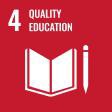
 Dutch startup SkillLab helps users turn their skills into careers. The startup’s mobile app uses artificial intelligence (AI) and gamification to build every user’s individual skill profile. The skill development solution provides customized education recommendations, allowing users to explore different career options. It also automatically generates skill-based application materials, as well as helps users find the desired jobs.
https://skilllab.io/
Dutch startup SkillLab helps users turn their skills into careers. The startup’s mobile app uses artificial intelligence (AI) and gamification to build every user’s individual skill profile. The skill development solution provides customized education recommendations, allowing users to explore different career options. It also automatically generates skill-based application materials, as well as helps users find the desired jobs.
https://skilllab.io/
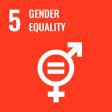 Gender equality is not only a fundamental human right, but a necessary foundation for a peaceful, prosperous and sustainable world.
There has been some progress over the last decades: More girls are going to school, fewer girls are forced into early marriage, more women are serving in parliament and positions of leadership, and laws are being reformed to advance gender equality.
Despite these gains, many challenges remain: discriminatory laws and social norms remain pervasive, women continue to be underrepresented at all levels of political leadership, and 1 in 5 women and girls between the ages of 15 and 49 report experiencing physical or sexual violence by an intimate partner within a 12-month period.
Gender equality is not only a fundamental human right, but a necessary foundation for a peaceful, prosperous and sustainable world.
There has been some progress over the last decades: More girls are going to school, fewer girls are forced into early marriage, more women are serving in parliament and positions of leadership, and laws are being reformed to advance gender equality.
Despite these gains, many challenges remain: discriminatory laws and social norms remain pervasive, women continue to be underrepresented at all levels of political leadership, and 1 in 5 women and girls between the ages of 15 and 49 report experiencing physical or sexual violence by an intimate partner within a 12-month period.
 German startup Equalista is building the Equalista, a gender equality learning app that helps users discover why inequality exists, what it looks like, how to talk about gender, and to test user biases to eventually impact change in the real world. Equalista provides knowledge about the more subtle forms of gender bias and creates awareness about existing stereotypes, unconscious biases, and deep-rooted beliefs. The solution uses gamification techniques to change perpetrators’ behaviour and to help victims manage the situation for a positive outcome.
https://equalista.com/
German startup Equalista is building the Equalista, a gender equality learning app that helps users discover why inequality exists, what it looks like, how to talk about gender, and to test user biases to eventually impact change in the real world. Equalista provides knowledge about the more subtle forms of gender bias and creates awareness about existing stereotypes, unconscious biases, and deep-rooted beliefs. The solution uses gamification techniques to change perpetrators’ behaviour and to help victims manage the situation for a positive outcome.
https://equalista.com/
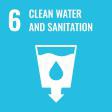

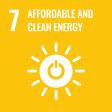 The world is making progress towards Goal 7, with signs that energy is becoming more sustainable and widely available. Access to electricity in poorer countries has begun to accelerate, energy efficiency continues to improve, and renewable energy is making impressive gains in the electricity sector.
Nevertheless, more focused attention is needed to improve access to clean and safe cooking fuels and technologies for 3 billion people, to expand the use of renewable energy beyond the electricity sector, and to increase electrification in sub-Saharan Africa.
The world is making progress towards Goal 7, with signs that energy is becoming more sustainable and widely available. Access to electricity in poorer countries has begun to accelerate, energy efficiency continues to improve, and renewable energy is making impressive gains in the electricity sector.
Nevertheless, more focused attention is needed to improve access to clean and safe cooking fuels and technologies for 3 billion people, to expand the use of renewable energy beyond the electricity sector, and to increase electrification in sub-Saharan Africa.
 Australian startup PowerLedger develops smart ledgers using blockchain and offers renewable energy providers and users with three main solutions. Their energy trading platform allows users with rooftop solar or battery storage to buy and sell their electricity. They provide greater transparency to environmental commodities trading and renewable energy credits. They also develop an asset ownership model that allows socio-economically poor households to benefit from renewable energy assets.
https://www.powerledger.io/
Australian startup PowerLedger develops smart ledgers using blockchain and offers renewable energy providers and users with three main solutions. Their energy trading platform allows users with rooftop solar or battery storage to buy and sell their electricity. They provide greater transparency to environmental commodities trading and renewable energy credits. They also develop an asset ownership model that allows socio-economically poor households to benefit from renewable energy assets.
https://www.powerledger.io/
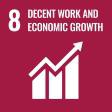 Sustained and inclusive economic growth can drive progress, create decent jobs for all and improve living standards.
COVID-19 has disrupted billions of lives and endangered the global economy. Even before the outbreak of COVID-19, one in five countries – home to billions of people living in poverty – were likely to see per capita incomes stagnate or decline in 2020.
Now, the economic and financial shocks associated with COVID-19—such as disruptions to industrial production, falling commodity prices, financial market volatility, and rising insecurity—are derailing the already tepid economic growth and compounding heightened risks from other factors.
Sustained and inclusive economic growth can drive progress, create decent jobs for all and improve living standards.
COVID-19 has disrupted billions of lives and endangered the global economy. Even before the outbreak of COVID-19, one in five countries – home to billions of people living in poverty – were likely to see per capita incomes stagnate or decline in 2020.
Now, the economic and financial shocks associated with COVID-19—such as disruptions to industrial production, falling commodity prices, financial market volatility, and rising insecurity—are derailing the already tepid economic growth and compounding heightened risks from other factors.
 Canadian startup POKET develops mobile tools for crowdsourcing data. Through self-reported data, citizen-generated data, and participatory mapping, the startup derives location-specific insights. Since the contributors are rewarded only after the verification of data, businesses get the best data returns on their spending. The startup’s solutions provide valuable insights into local communities, especially marginalized people where traditional data might be lacking.
https://www.poketapp.com/
Canadian startup POKET develops mobile tools for crowdsourcing data. Through self-reported data, citizen-generated data, and participatory mapping, the startup derives location-specific insights. Since the contributors are rewarded only after the verification of data, businesses get the best data returns on their spending. The startup’s solutions provide valuable insights into local communities, especially marginalized people where traditional data might be lacking.
https://www.poketapp.com/
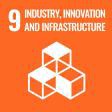 Innovation and technological progress are key to finding lasting solutions to both economic and environmental challenges, such as increased resource and energy-efficiency.
Globally, investment in research and development (R&D) as a proportion of GDP increased from 1.5 per cent in 2000 to 1.7 per cent in 2015 and remained almost unchanged in 2017, but was only less than 1 per cent in developing regions.
The Economic and Social Survey of Asia and the Pacific highlights that making infrastructure resilient to disasters and climate change will require an additional investment of $434 billion per year. This sum may need to be even greater in some subregions, such as the Pacific small island developing states.
Innovation and technological progress are key to finding lasting solutions to both economic and environmental challenges, such as increased resource and energy-efficiency.
Globally, investment in research and development (R&D) as a proportion of GDP increased from 1.5 per cent in 2000 to 1.7 per cent in 2015 and remained almost unchanged in 2017, but was only less than 1 per cent in developing regions.
The Economic and Social Survey of Asia and the Pacific highlights that making infrastructure resilient to disasters and climate change will require an additional investment of $434 billion per year. This sum may need to be even greater in some subregions, such as the Pacific small island developing states.
 Norwegian startup Applied Autonomy develops solutions for sustainable autonomous transportation. The company uses the Internet of Things (IoT) and big data to combine data from multiple sources such as connected vehicles and traffic data. This paves the way for applications in smart mobility ranging from geofencing and vehicle monitoring to on-demand trip management. The startup also offers a smart fleet management system for transport operators to run their fleets safely and efficiently.
https://www.appliedautonomy.no/
Norwegian startup Applied Autonomy develops solutions for sustainable autonomous transportation. The company uses the Internet of Things (IoT) and big data to combine data from multiple sources such as connected vehicles and traffic data. This paves the way for applications in smart mobility ranging from geofencing and vehicle monitoring to on-demand trip management. The startup also offers a smart fleet management system for transport operators to run their fleets safely and efficiently.
https://www.appliedautonomy.no/
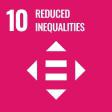 Reducing inequalities and ensuring no one is left behind are integral to achieving the Sustainable Development Goals.
Inequality within and among countries is a persistent cause for concern. Despite some positive signs toward reducing inequality in some dimensions, such as reducing relative income inequality in some countries and preferential trade status benefiting
lower-income countries, inequality still persists,
Inequalities are also deepening for vulnerable populations in countries with weaker health systems and those facing existing humanitarian crises. Refugees and migrants, as well as indigenous peoples, older persons, people with disabilities and children are particularly at risk of being left behind.
Reducing inequalities and ensuring no one is left behind are integral to achieving the Sustainable Development Goals.
Inequality within and among countries is a persistent cause for concern. Despite some positive signs toward reducing inequality in some dimensions, such as reducing relative income inequality in some countries and preferential trade status benefiting
lower-income countries, inequality still persists,
Inequalities are also deepening for vulnerable populations in countries with weaker health systems and those facing existing humanitarian crises. Refugees and migrants, as well as indigenous peoples, older persons, people with disabilities and children are particularly at risk of being left behind.
 Danish startup ARYZE develops financial inclusion tools. The startup’s MAMApay range of solutions optimizes and modernizes money management for individuals and businesses. Its solutions include a mobile payment app, a transparent financial services platform, and a checkout solution for businesses with physical or virtual stores. The startup’s tools reduce international money transfer costs to ensure almost all of the remittance money makes it back to developing countries.
https://aryze.io/
Danish startup ARYZE develops financial inclusion tools. The startup’s MAMApay range of solutions optimizes and modernizes money management for individuals and businesses. Its solutions include a mobile payment app, a transparent financial services platform, and a checkout solution for businesses with physical or virtual stores. The startup’s tools reduce international money transfer costs to ensure almost all of the remittance money makes it back to developing countries.
https://aryze.io/
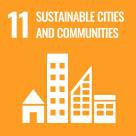 The world is becoming increasingly urbanized. Since 2007, more than half the world’s population has been living in cities, and that share is projected to rise to 60 per cent by 2030.
World leaders recognized unanimously at the 2012 United Nations Conference on Sustainable Development (Rio +20) that transportation and mobility are central to sustainable development. Sustainable transportation can enhance economic growth and improve accessibility.
Sustainable transport achieves better integration of the economy while respecting the environment. improving social equity, health, resilience of cities, urban-rural linkages and productivity of rural areas.
The world is becoming increasingly urbanized. Since 2007, more than half the world’s population has been living in cities, and that share is projected to rise to 60 per cent by 2030.
World leaders recognized unanimously at the 2012 United Nations Conference on Sustainable Development (Rio +20) that transportation and mobility are central to sustainable development. Sustainable transportation can enhance economic growth and improve accessibility.
Sustainable transport achieves better integration of the economy while respecting the environment. improving social equity, health, resilience of cities, urban-rural linkages and productivity of rural areas.
 Futureproofed is a Belgian startup developing emissions tracking solutions to help fight climate change. FutureproofedCities tracks past and projected emissions, as well as offers solutions for carbon mitigation and adaptation. It also publishes a web dashboard to help cities engage citizens with climate actions, measures, and progress. The startup’s solution helps cities put their climate action plans in motion and learn from other cities and municipalities.
https://www.futureproofed.com/
Futureproofed is a Belgian startup developing emissions tracking solutions to help fight climate change. FutureproofedCities tracks past and projected emissions, as well as offers solutions for carbon mitigation and adaptation. It also publishes a web dashboard to help cities engage citizens with climate actions, measures, and progress. The startup’s solution helps cities put their climate action plans in motion and learn from other cities and municipalities.
https://www.futureproofed.com/
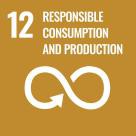 Worldwide consumption and production — a driving force of the global economy — rest on the use of the natural environment and resources in a way that continues to have destructive impacts on the planet.
Sustainable consumption and production is about doing more and better with less. It is also about decoupling economic growth from environmental degradation, increasing resource efficiency and promoting sustainable lifestyles.
Sustainable consumption and production can also contribute substantially to poverty alleviation and the transition towards
low-carbon and green economies.
Worldwide consumption and production — a driving force of the global economy — rest on the use of the natural environment and resources in a way that continues to have destructive impacts on the planet.
Sustainable consumption and production is about doing more and better with less. It is also about decoupling economic growth from environmental degradation, increasing resource efficiency and promoting sustainable lifestyles.
Sustainable consumption and production can also contribute substantially to poverty alleviation and the transition towards
low-carbon and green economies.
 Meet the startup:
HYDRAO is a French startup developing smart solutions for water conservation. The Hydrao Meter uses the Internet of Things (IoT) to gather information on the volume, flow rate, and temperature of water in buildings. The
self-powered motor features a micro-turbine, enabling a long lifespan without a battery. It detects abnormal consumption such as leaks and poorly closed taps as well as analyzes water use in smart buildings.
https://pro.hydrao.com/
Meet the startup:
HYDRAO is a French startup developing smart solutions for water conservation. The Hydrao Meter uses the Internet of Things (IoT) to gather information on the volume, flow rate, and temperature of water in buildings. The
self-powered motor features a micro-turbine, enabling a long lifespan without a battery. It detects abnormal consumption such as leaks and poorly closed taps as well as analyzes water use in smart buildings.
https://pro.hydrao.com/
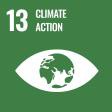 Climate change is affecting every country on every continent. It is disrupting national economies and affecting lives. Weather patterns are changing, sea levels are rising, and weather events are becoming more extreme.
Saving lives and livelihoods requires urgent action to address both the pandemic and the climate emergency.The Paris Agreement, adopted in 2015, aims to strengthen the global response to the threat of climate change by keeping a global temperature rise this century well below 2 degrees Celsius above
pre-industrial levels. The agreement also aims to strengthen the ability of countries to deal with the impacts of climate change, through appropriate financial flows, a new technology framework and an enhanced capacity building framework.
Meet the startup:
Climate change is affecting every country on every continent. It is disrupting national economies and affecting lives. Weather patterns are changing, sea levels are rising, and weather events are becoming more extreme.
Saving lives and livelihoods requires urgent action to address both the pandemic and the climate emergency.The Paris Agreement, adopted in 2015, aims to strengthen the global response to the threat of climate change by keeping a global temperature rise this century well below 2 degrees Celsius above
pre-industrial levels. The agreement also aims to strengthen the ability of countries to deal with the impacts of climate change, through appropriate financial flows, a new technology framework and an enhanced capacity building framework.
Meet the startup:
 Captura provides low-cost atmospheric carbon removal by leveraging the world’s largest natural CO2 absorber – the ocean. Their patented electrodialysis process generates a stream of pure CO2 that can then be sequestered or utilised to make other low-carbon products. The CO2 removed from the shallow ocean allows the ocean to regenerate and runs on renewable energy.
https://capturacorp.com/
Captura provides low-cost atmospheric carbon removal by leveraging the world’s largest natural CO2 absorber – the ocean. Their patented electrodialysis process generates a stream of pure CO2 that can then be sequestered or utilised to make other low-carbon products. The CO2 removed from the shallow ocean allows the ocean to regenerate and runs on renewable energy.
https://capturacorp.com/
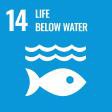 About the goal:
The ocean drives global systems that make the Earth habitable for humankind. Our rainwater, drinking water, weather, climate, coastlines, much of our food, and even the oxygen in the air we breathe, are all ultimately provided and regulated by the sea.
Saving our ocean must remain a priority. Marine biodiversity is critical to the health of people and our planet. Marine protected areas need to be effectively managed and
well-resourced and regulations need to be put in place to reduce overfishing, marine pollution and ocean acidification.
Meet the startup:
About the goal:
The ocean drives global systems that make the Earth habitable for humankind. Our rainwater, drinking water, weather, climate, coastlines, much of our food, and even the oxygen in the air we breathe, are all ultimately provided and regulated by the sea.
Saving our ocean must remain a priority. Marine biodiversity is critical to the health of people and our planet. Marine protected areas need to be effectively managed and
well-resourced and regulations need to be put in place to reduce overfishing, marine pollution and ocean acidification.
Meet the startup:
 Mexican startup microTERRA grows plant-based protein in aquafarms. The startup’s solution improves sustainability by preventing nitrogen and phosphorus runoff. This advances the circular economy by upcycling nutrient pollution into plant-based protein. Moreover, it offers an affordable and scalable alternative to both fish feed and human food.
https://www.microterra.com/
Mexican startup microTERRA grows plant-based protein in aquafarms. The startup’s solution improves sustainability by preventing nitrogen and phosphorus runoff. This advances the circular economy by upcycling nutrient pollution into plant-based protein. Moreover, it offers an affordable and scalable alternative to both fish feed and human food.
https://www.microterra.com/
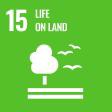 About the goal:
Nature is critical to our survival: nature provides us with our oxygen, regulates our weather patterns, pollinates our crops, produces our food, feed and fibre. But it is under increasing stress. Human activity has altered almost 75 percent of the earth’s surface, squeezing wildlife and nature into an ever-smaller corner of the planet.
Around 1 million animal and plant species are threatened with extinction – many within decades – according to the 2019 Global Assessment Report on Biodiversity and Ecosystem Service.
Meet the startup:
About the goal:
Nature is critical to our survival: nature provides us with our oxygen, regulates our weather patterns, pollinates our crops, produces our food, feed and fibre. But it is under increasing stress. Human activity has altered almost 75 percent of the earth’s surface, squeezing wildlife and nature into an ever-smaller corner of the planet.
Around 1 million animal and plant species are threatened with extinction – many within decades – according to the 2019 Global Assessment Report on Biodiversity and Ecosystem Service.
Meet the startup:
 UBEES is a US-based precision beekeeping startup. The startup combines traditional beekeeping with sensors for non-intrusive and remote monitoring of the hives’ health. Ubees’ solution monitors the levels of parasites, pathogens, exposure to pesticides, and bee nutrition to facilitate data-driven
decision-making. This helps beekeepers increase profits while saving the local biodiversity around food supply chains.
https://www.ubees.com
UBEES is a US-based precision beekeeping startup. The startup combines traditional beekeeping with sensors for non-intrusive and remote monitoring of the hives’ health. Ubees’ solution monitors the levels of parasites, pathogens, exposure to pesticides, and bee nutrition to facilitate data-driven
decision-making. This helps beekeepers increase profits while saving the local biodiversity around food supply chains.
https://www.ubees.com
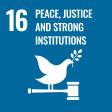 Compassion and a strong moral compass is essential to every democratic society. Yet, persecution, injustice and abuse still runs rampant and is tearing at the very fabric of civilization.
SDG 16 intends peaceful and inclusive societies based on respect for human rights, protection of the most vulnerable, the rule of law and good governance at all levels.
It also envisions transparent, effective and accountable institutions, which promote
non-discriminatory laws and policies, combat corruption, bribery and organised crime and prevent violence, terrorism and crime.
It calls for responsive, inclusive, participatory and representative decision-making, with an enhanced role of developing countries in institutions of global governance.
Compassion and a strong moral compass is essential to every democratic society. Yet, persecution, injustice and abuse still runs rampant and is tearing at the very fabric of civilization.
SDG 16 intends peaceful and inclusive societies based on respect for human rights, protection of the most vulnerable, the rule of law and good governance at all levels.
It also envisions transparent, effective and accountable institutions, which promote
non-discriminatory laws and policies, combat corruption, bribery and organised crime and prevent violence, terrorism and crime.
It calls for responsive, inclusive, participatory and representative decision-making, with an enhanced role of developing countries in institutions of global governance.
 Visual Contract, as the name suggests, create visual contracts that help people make autonomous decisions and build sustainable relationships. Their visual contracts are pro-active and result focused instead of traditional, only risk averse and written for courts/judges/lawyer.
They believe anyone is capable of making good contracts and the law should be accessible to everyone, just as the medium that is used to create these contracts to make them tangible.
https://visualcontracts.eu/about/impact/
Visual Contract, as the name suggests, create visual contracts that help people make autonomous decisions and build sustainable relationships. Their visual contracts are pro-active and result focused instead of traditional, only risk averse and written for courts/judges/lawyer.
They believe anyone is capable of making good contracts and the law should be accessible to everyone, just as the medium that is used to create these contracts to make them tangible.
https://visualcontracts.eu/about/impact/
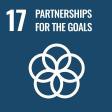 The SDGs can only be realised with strong global partnerships and cooperation.
A successful development agenda requires inclusive partnerships — at the global, regional, national and local levels — built upon principles and values, and upon a shared vision and shared goals placing people and the planet at the centre.
Many countries require Official Development Assistance to encourage growth and trade.
Yet, aid levels are falling and donor countries have not lived up to their pledge to ramp up development finance.
Strong international cooperation is needed now more than ever to ensure that countries have the means to recover from the pandemic, build back better and achieve the Sustainable Development Goals.
The SDGs can only be realised with strong global partnerships and cooperation.
A successful development agenda requires inclusive partnerships — at the global, regional, national and local levels — built upon principles and values, and upon a shared vision and shared goals placing people and the planet at the centre.
Many countries require Official Development Assistance to encourage growth and trade.
Yet, aid levels are falling and donor countries have not lived up to their pledge to ramp up development finance.
Strong international cooperation is needed now more than ever to ensure that countries have the means to recover from the pandemic, build back better and achieve the Sustainable Development Goals.
 British FinTech startup World Wide Generation builds a digital sustainability management and reporting tool, G17Eco. Leveraging Industry 4.0 technologies, G17Eco is an open architecture platform that enables partners to connect and deliver effective and scalable products and services. The G17Eco global project management system utilizes data bots and distributed ledger technology (DLT) to automate the mapping, monitoring, measuring, managing, and marketing of stakeholders’ contributions to the SDGs. WWG’s platform also incorporates many layers of technology infrastructure, taxonomies, and governing councils, as well as provides interoperability with sectors, systems, and apps.
https://www.worldwidegeneration.co/
British FinTech startup World Wide Generation builds a digital sustainability management and reporting tool, G17Eco. Leveraging Industry 4.0 technologies, G17Eco is an open architecture platform that enables partners to connect and deliver effective and scalable products and services. The G17Eco global project management system utilizes data bots and distributed ledger technology (DLT) to automate the mapping, monitoring, measuring, managing, and marketing of stakeholders’ contributions to the SDGs. WWG’s platform also incorporates many layers of technology infrastructure, taxonomies, and governing councils, as well as provides interoperability with sectors, systems, and apps.
https://www.worldwidegeneration.co/
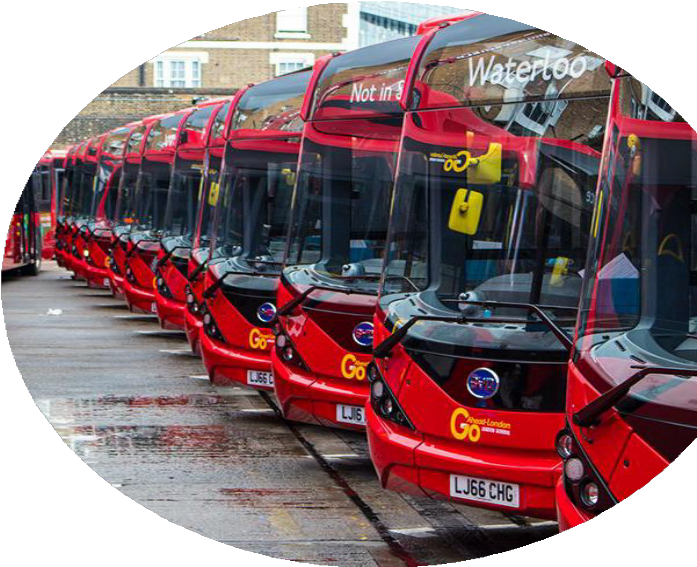 When Go-Ahead wanted to meet the latest innovators in sustainable travel, they came to Co:cubed. We delivered a bespoke programme to help them partner with scaleups to achieve their sustainability ambitions as a company.
Background
Go-Ahead are one of the UK’s leading public transport providers enabling over one billion passenger journeys every year. Go-Ahead wanted to find new and innovative ways to improve the passenger experience, champion sustainable travel and drive operational efficiency.
Solution
We developed a bespoke Proof of Concept programme designed to give some of the world’s best transport scale-ups exclusive access
Go-Ahead’s data, infrastructure and expertise to refine and develop their solutions. 20 scale-ups took part in the 8 week Billion Journey Project across two cohorts, culminating in high impact demo days attended by over 500 transport providers and partners, government representatives and media.
Impact
17 of the scaleups have since gone on to launch commercial pilots with Go-Ahead and are already making an impact on the future of transport.
When Go-Ahead wanted to meet the latest innovators in sustainable travel, they came to Co:cubed. We delivered a bespoke programme to help them partner with scaleups to achieve their sustainability ambitions as a company.
Background
Go-Ahead are one of the UK’s leading public transport providers enabling over one billion passenger journeys every year. Go-Ahead wanted to find new and innovative ways to improve the passenger experience, champion sustainable travel and drive operational efficiency.
Solution
We developed a bespoke Proof of Concept programme designed to give some of the world’s best transport scale-ups exclusive access
Go-Ahead’s data, infrastructure and expertise to refine and develop their solutions. 20 scale-ups took part in the 8 week Billion Journey Project across two cohorts, culminating in high impact demo days attended by over 500 transport providers and partners, government representatives and media.
Impact
17 of the scaleups have since gone on to launch commercial pilots with Go-Ahead and are already making an impact on the future of transport.
Eliminating food waste at Asda
When Asda set their ambition to halve food waste, we searched the globe for a world-class solution. The result was WhyWaste, a solution which is now being deployed in every Asda store across the UK.
Background
One third of all food produced goes to landfill. As one of the UK’s major supermarkets, Asda are on a mission to reduce food waste by at least 50% by 2030. This ambitious target requires new tools, technologies and processes that empower store associates to take action and clear produce which is nearing expiry.
Solution
One third of all food produced goes to landfill. As one of the UK’s major supermarkets, Asda are on a mission to reduce food waste by at least 50% by 2030. This ambitious target requires new tools, technologies and processes that empower store associates to take action and clear produce which is nearing expiry.
Impact
Following an initial pilot in 2020, Asda is now deploying WhyWaste across their entire store footprint. “We have had great feedback from our stores and we are excited by the positive impact this new technology will have”, said Asda’s waste process manager Andrew Hudson. While
Asda-specific results are confidential, WhyWaste’s solution typically delivers a 90% reduction in food waste, while simultaneously saving store associates time and improving retailer margin.


















































 Let’s co!
Let’s co!
What are the UN Sustainability Goals?
 Going back to basics, feel free to skip past if you’re already up to speed with all things SDGs…
The 2020 Agenda for Sustainable Development adopted by all United Nations Member States in 2015, provides a shared blueprint for peace and prosperity for people and the planet, now and into the future. At its heart the 17 Sustainable Development Goals (SDGs) are an urgent call for action by all countries – developed and developing – in a global partnership. They recognise that ending poverty and other deprivations must go
hand-in-hand with strategies that improve health and education, reduce inequality, and spur economic growth – all while tackling climate change and working to preserve our oceans and forests. The SDGs build on decades of work by countries and the UN, including the UN Department of Economic and Social Affairs.
Going back to basics, feel free to skip past if you’re already up to speed with all things SDGs…
The 2020 Agenda for Sustainable Development adopted by all United Nations Member States in 2015, provides a shared blueprint for peace and prosperity for people and the planet, now and into the future. At its heart the 17 Sustainable Development Goals (SDGs) are an urgent call for action by all countries – developed and developing – in a global partnership. They recognise that ending poverty and other deprivations must go
hand-in-hand with strategies that improve health and education, reduce inequality, and spur economic growth – all while tackling climate change and working to preserve our oceans and forests. The SDGs build on decades of work by countries and the UN, including the UN Department of Economic and Social Affairs.
What’s this got to do with corporates?
There is legislation coming down the line that is predicted to significantly impact large companies. This proposed Directive of the European Parliament and of the Council on Corporate Sustainability Due Diligence will add a substantive corporate duty for some companies to identify, prevent, mitigate and account for external harm resulting from adverse human rights and environmental impacts in the company’s own operations, its subsidiaries and in the value chain. At EU level, sustainable corporate governance has been mainly fostered indirectly by imposing reporting requirements in the Non-Financial Reporting Directive (NFRD) on approximately 12, 000 companies concerning environmental, social and human rights related risks, impacts, measures (including due diligence) and policies. The NFRD had some positive impact on improvement of responsible business operation, but has not resulted in the majority of companies taking sufficient account of their adverse impacts in their value chains. The Commission’s recent proposal for a Corporate Sustainability Reporting Directive (CSRD), revising the NFR , would extend the scope of the companies covered to all large and all listed companies, require the audit (assurance) of reported information and strengthen the standardisation of reported information by empowering the Commission to adopt sustainability reporting standards. Given the legislative changes, there is a need to innovate quickly, which is why many companies are looking to startups for solutions…The Case for Innovation
Only 100 companies has been the source of 75% of global emissions over the last 30 years…
Innovation is now seen as a necessity, not a luxury, as all corporations are currently failing to fulfill their sustainability commitments.Build, buy or partner?
Corporates of the future realise that their job is not to invent the future, but to scale it. Startups will have the innovative solution to help a corporate advance their sustainability efforts, but will require the scale to make it impactful. These solutions may be more cutting-edge or efficient than what a corporate could develop in-house, or what is currently available on the market. Collaborating can be cheaper, faster and better Developing a solution in-house may require a significant investment of time and resources, and there is always the risk that the solution may not be successful. Acquiring a company can also be a lengthy and costly process, and there is always the risk that the acquisition may not align with the corporate’s goals and internal culture or may not be successful. Partnering with a startup can help a corporate to be more agile and responsive to changes in the market or industry. Startups are often more flexible and able to pivot quickly, which can help the corporate to keep pace with evolving sustainability goals and expectations. In the last 6 years, Co:cubed has worked with 50+ of the FTSE 100, connecting them to our network of 12 million startups and enabling collaborations that lead to them working together to solve the world’s biggest problems outlined in the United Nations 17 Sustainable Development Goals.
Ready to meet the startups solving the world’s biggest problems?
SDG 1: NO POVERTY
About the goal:
Meet the startup:
Czech startup DOT Glasses provides low-cost prescription eyeglasses. The startup further offers small kits for vision testing to enable brands and organisations to set up vision camps. It also includes frame components of eyeglasses and scratch-resistant polycarbonate lenses. The startup distributes its eyeglasses via multiple channels, including non profits, micro entrepreneur networks, and government entities. As a result, this increases the productivity and earnings of low-income people. https://www.dotglasses.org/product/
SDG 2: ZERO HUNGER
About the goal:
 The world is not on track to achieve Zero Hunger by 2030. If recent trends continue, the number of people affected by hunger will surpass 840 million by 2030. With more than a quarter of a billion people on the brink of starvation, swift action must be taken to provide food and humanitarian relief to the most at-risk regions.
At the same time, a profound change of the global food and agriculture system is needed if we are to nourish the more than 690 million people who are hungry today. Increasing agricultural productivity and sustainable food production are crucial to help alleviate the perils of hunger.
The world is not on track to achieve Zero Hunger by 2030. If recent trends continue, the number of people affected by hunger will surpass 840 million by 2030. With more than a quarter of a billion people on the brink of starvation, swift action must be taken to provide food and humanitarian relief to the most at-risk regions.
At the same time, a profound change of the global food and agriculture system is needed if we are to nourish the more than 690 million people who are hungry today. Increasing agricultural productivity and sustainable food production are crucial to help alleviate the perils of hunger.
Meet the startup:
 US-based startup Agbotic develops technology for smart farms. The startup’s SmartFarm platform combines ecology and technology to enable resilient and sustainable farming. It promotes regenerative farming by strategic tree planting, crop rotation, carbon sequestration, and habitat restoration. The startup also utilizes automation and advanced analytics to enable improvements in crop quality and yield while minimizing resource use.
https://www.agbotic.com/smartfarm
US-based startup Agbotic develops technology for smart farms. The startup’s SmartFarm platform combines ecology and technology to enable resilient and sustainable farming. It promotes regenerative farming by strategic tree planting, crop rotation, carbon sequestration, and habitat restoration. The startup also utilizes automation and advanced analytics to enable improvements in crop quality and yield while minimizing resource use.
https://www.agbotic.com/smartfarm
SDG 3: GOOD HEALTH & WELLBEING
About the goal:
 Before the pandemic, major progress was made in improving the health of millions of people. Significant strides were made in increasing life expectancy and reducing some of the common killers associated with child and maternal mortality. But more efforts are needed to fully eradicate a wide range of diseases and address many different persistent and emerging health issues. By focusing on providing more efficient funding of health systems, improved sanitation and hygiene, and increased access to physicians, significant progress can be made in helping to save the lives of millions.
The United Nations Development Programme highlighted huge disparities in countries’ abilities to cope with and recover from the Covid-19 crisis, for example.
Before the pandemic, major progress was made in improving the health of millions of people. Significant strides were made in increasing life expectancy and reducing some of the common killers associated with child and maternal mortality. But more efforts are needed to fully eradicate a wide range of diseases and address many different persistent and emerging health issues. By focusing on providing more efficient funding of health systems, improved sanitation and hygiene, and increased access to physicians, significant progress can be made in helping to save the lives of millions.
The United Nations Development Programme highlighted huge disparities in countries’ abilities to cope with and recover from the Covid-19 crisis, for example.
Meet the startup:
 Irish startup FoodMarble designs and develops a personal digestive tracker that detects the amount of hydrogen in human breath. Aiming to solve the highly prevalent digestion disorder problem, this simple but powerful solution captures the hydrogen released by undigested food that travels from the gut, through the blood, to the mouth. The tracker empowers users to understand which food works for their digestion system and supports them to transition to better diets.
https://foodmarble.com/
Irish startup FoodMarble designs and develops a personal digestive tracker that detects the amount of hydrogen in human breath. Aiming to solve the highly prevalent digestion disorder problem, this simple but powerful solution captures the hydrogen released by undigested food that travels from the gut, through the blood, to the mouth. The tracker empowers users to understand which food works for their digestion system and supports them to transition to better diets.
https://foodmarble.com/
SDG 4: QUALITY EDUCATION

About the goal:
Education enables upward socioeconomic mobility and is a key to escaping poverty. Over the past decade, major progress was made towards increasing access to education and school enrollment rates at all levels, particularly for girls. Nevertheless, about 260 million children were still out of school in 2018 — nearly one fifth of the global population in that age group. And more than half of all children and adolescents worldwide are not meeting minimum proficiency standards in reading and mathematics.Meet the startup:
 Dutch startup SkillLab helps users turn their skills into careers. The startup’s mobile app uses artificial intelligence (AI) and gamification to build every user’s individual skill profile. The skill development solution provides customized education recommendations, allowing users to explore different career options. It also automatically generates skill-based application materials, as well as helps users find the desired jobs.
https://skilllab.io/
Dutch startup SkillLab helps users turn their skills into careers. The startup’s mobile app uses artificial intelligence (AI) and gamification to build every user’s individual skill profile. The skill development solution provides customized education recommendations, allowing users to explore different career options. It also automatically generates skill-based application materials, as well as helps users find the desired jobs.
https://skilllab.io/
SDG 5: GENDER EQUALITY
About the goal:
 Gender equality is not only a fundamental human right, but a necessary foundation for a peaceful, prosperous and sustainable world.
There has been some progress over the last decades: More girls are going to school, fewer girls are forced into early marriage, more women are serving in parliament and positions of leadership, and laws are being reformed to advance gender equality.
Despite these gains, many challenges remain: discriminatory laws and social norms remain pervasive, women continue to be underrepresented at all levels of political leadership, and 1 in 5 women and girls between the ages of 15 and 49 report experiencing physical or sexual violence by an intimate partner within a 12-month period.
Gender equality is not only a fundamental human right, but a necessary foundation for a peaceful, prosperous and sustainable world.
There has been some progress over the last decades: More girls are going to school, fewer girls are forced into early marriage, more women are serving in parliament and positions of leadership, and laws are being reformed to advance gender equality.
Despite these gains, many challenges remain: discriminatory laws and social norms remain pervasive, women continue to be underrepresented at all levels of political leadership, and 1 in 5 women and girls between the ages of 15 and 49 report experiencing physical or sexual violence by an intimate partner within a 12-month period.
Meet the startup:
 German startup Equalista is building the Equalista, a gender equality learning app that helps users discover why inequality exists, what it looks like, how to talk about gender, and to test user biases to eventually impact change in the real world. Equalista provides knowledge about the more subtle forms of gender bias and creates awareness about existing stereotypes, unconscious biases, and deep-rooted beliefs. The solution uses gamification techniques to change perpetrators’ behaviour and to help victims manage the situation for a positive outcome.
https://equalista.com/
German startup Equalista is building the Equalista, a gender equality learning app that helps users discover why inequality exists, what it looks like, how to talk about gender, and to test user biases to eventually impact change in the real world. Equalista provides knowledge about the more subtle forms of gender bias and creates awareness about existing stereotypes, unconscious biases, and deep-rooted beliefs. The solution uses gamification techniques to change perpetrators’ behaviour and to help victims manage the situation for a positive outcome.
https://equalista.com/
SDG 6: CLEAN WATER & SANITATION

About the goal:
While substantial progress has been made in increasing access to clean drinking water and sanitation, billions of people—mostly in rural areas—still lack these basic services. Worldwide, one in three people do not have access to safe drinking water, two out of five people do not have a basic hand-washing facility with soap and water, and more than 673 million people still practice open defecation.
Meet the startup:
Aquahara is a German startup developing an industrial air dehumidification technology. The startup’s technology uses salt to absorb water. It then uses solar energy to heat the salt solution in a distillation unit, thus recovering the water. Aquahara’s solution reduces costs as compared to atmospheric water generation, producing 100 liters of water per day with 400 square meters of solar panels. https://aquahara.com/SDG 7: AFFORDABLE & CLEAN ENERGY
About the goal:
 The world is making progress towards Goal 7, with signs that energy is becoming more sustainable and widely available. Access to electricity in poorer countries has begun to accelerate, energy efficiency continues to improve, and renewable energy is making impressive gains in the electricity sector.
Nevertheless, more focused attention is needed to improve access to clean and safe cooking fuels and technologies for 3 billion people, to expand the use of renewable energy beyond the electricity sector, and to increase electrification in sub-Saharan Africa.
The world is making progress towards Goal 7, with signs that energy is becoming more sustainable and widely available. Access to electricity in poorer countries has begun to accelerate, energy efficiency continues to improve, and renewable energy is making impressive gains in the electricity sector.
Nevertheless, more focused attention is needed to improve access to clean and safe cooking fuels and technologies for 3 billion people, to expand the use of renewable energy beyond the electricity sector, and to increase electrification in sub-Saharan Africa.
Meet the startup:
 Australian startup PowerLedger develops smart ledgers using blockchain and offers renewable energy providers and users with three main solutions. Their energy trading platform allows users with rooftop solar or battery storage to buy and sell their electricity. They provide greater transparency to environmental commodities trading and renewable energy credits. They also develop an asset ownership model that allows socio-economically poor households to benefit from renewable energy assets.
https://www.powerledger.io/
Australian startup PowerLedger develops smart ledgers using blockchain and offers renewable energy providers and users with three main solutions. Their energy trading platform allows users with rooftop solar or battery storage to buy and sell their electricity. They provide greater transparency to environmental commodities trading and renewable energy credits. They also develop an asset ownership model that allows socio-economically poor households to benefit from renewable energy assets.
https://www.powerledger.io/
SDG 8: DECENT WORK & ECONOMIC GROWTH
© 2023, CO:CUBED Limited, Strictly private & confidentialAbout the goal:
 Sustained and inclusive economic growth can drive progress, create decent jobs for all and improve living standards.
COVID-19 has disrupted billions of lives and endangered the global economy. Even before the outbreak of COVID-19, one in five countries – home to billions of people living in poverty – were likely to see per capita incomes stagnate or decline in 2020.
Now, the economic and financial shocks associated with COVID-19—such as disruptions to industrial production, falling commodity prices, financial market volatility, and rising insecurity—are derailing the already tepid economic growth and compounding heightened risks from other factors.
Sustained and inclusive economic growth can drive progress, create decent jobs for all and improve living standards.
COVID-19 has disrupted billions of lives and endangered the global economy. Even before the outbreak of COVID-19, one in five countries – home to billions of people living in poverty – were likely to see per capita incomes stagnate or decline in 2020.
Now, the economic and financial shocks associated with COVID-19—such as disruptions to industrial production, falling commodity prices, financial market volatility, and rising insecurity—are derailing the already tepid economic growth and compounding heightened risks from other factors.
Meet the startup:
 Canadian startup POKET develops mobile tools for crowdsourcing data. Through self-reported data, citizen-generated data, and participatory mapping, the startup derives location-specific insights. Since the contributors are rewarded only after the verification of data, businesses get the best data returns on their spending. The startup’s solutions provide valuable insights into local communities, especially marginalized people where traditional data might be lacking.
https://www.poketapp.com/
Canadian startup POKET develops mobile tools for crowdsourcing data. Through self-reported data, citizen-generated data, and participatory mapping, the startup derives location-specific insights. Since the contributors are rewarded only after the verification of data, businesses get the best data returns on their spending. The startup’s solutions provide valuable insights into local communities, especially marginalized people where traditional data might be lacking.
https://www.poketapp.com/
SDG 9: INDUSTRY, INNOVATION & INFRASTRUCTURE
About the goal:
 Innovation and technological progress are key to finding lasting solutions to both economic and environmental challenges, such as increased resource and energy-efficiency.
Globally, investment in research and development (R&D) as a proportion of GDP increased from 1.5 per cent in 2000 to 1.7 per cent in 2015 and remained almost unchanged in 2017, but was only less than 1 per cent in developing regions.
The Economic and Social Survey of Asia and the Pacific highlights that making infrastructure resilient to disasters and climate change will require an additional investment of $434 billion per year. This sum may need to be even greater in some subregions, such as the Pacific small island developing states.
Innovation and technological progress are key to finding lasting solutions to both economic and environmental challenges, such as increased resource and energy-efficiency.
Globally, investment in research and development (R&D) as a proportion of GDP increased from 1.5 per cent in 2000 to 1.7 per cent in 2015 and remained almost unchanged in 2017, but was only less than 1 per cent in developing regions.
The Economic and Social Survey of Asia and the Pacific highlights that making infrastructure resilient to disasters and climate change will require an additional investment of $434 billion per year. This sum may need to be even greater in some subregions, such as the Pacific small island developing states.
Meet the startup:
 Norwegian startup Applied Autonomy develops solutions for sustainable autonomous transportation. The company uses the Internet of Things (IoT) and big data to combine data from multiple sources such as connected vehicles and traffic data. This paves the way for applications in smart mobility ranging from geofencing and vehicle monitoring to on-demand trip management. The startup also offers a smart fleet management system for transport operators to run their fleets safely and efficiently.
https://www.appliedautonomy.no/
Norwegian startup Applied Autonomy develops solutions for sustainable autonomous transportation. The company uses the Internet of Things (IoT) and big data to combine data from multiple sources such as connected vehicles and traffic data. This paves the way for applications in smart mobility ranging from geofencing and vehicle monitoring to on-demand trip management. The startup also offers a smart fleet management system for transport operators to run their fleets safely and efficiently.
https://www.appliedautonomy.no/
SDG 10: REDUCED INEQUALITIES
About the goal:
 Reducing inequalities and ensuring no one is left behind are integral to achieving the Sustainable Development Goals.
Inequality within and among countries is a persistent cause for concern. Despite some positive signs toward reducing inequality in some dimensions, such as reducing relative income inequality in some countries and preferential trade status benefiting
lower-income countries, inequality still persists,
Inequalities are also deepening for vulnerable populations in countries with weaker health systems and those facing existing humanitarian crises. Refugees and migrants, as well as indigenous peoples, older persons, people with disabilities and children are particularly at risk of being left behind.
Reducing inequalities and ensuring no one is left behind are integral to achieving the Sustainable Development Goals.
Inequality within and among countries is a persistent cause for concern. Despite some positive signs toward reducing inequality in some dimensions, such as reducing relative income inequality in some countries and preferential trade status benefiting
lower-income countries, inequality still persists,
Inequalities are also deepening for vulnerable populations in countries with weaker health systems and those facing existing humanitarian crises. Refugees and migrants, as well as indigenous peoples, older persons, people with disabilities and children are particularly at risk of being left behind.
Meet the startup:
 Danish startup ARYZE develops financial inclusion tools. The startup’s MAMApay range of solutions optimizes and modernizes money management for individuals and businesses. Its solutions include a mobile payment app, a transparent financial services platform, and a checkout solution for businesses with physical or virtual stores. The startup’s tools reduce international money transfer costs to ensure almost all of the remittance money makes it back to developing countries.
https://aryze.io/
Danish startup ARYZE develops financial inclusion tools. The startup’s MAMApay range of solutions optimizes and modernizes money management for individuals and businesses. Its solutions include a mobile payment app, a transparent financial services platform, and a checkout solution for businesses with physical or virtual stores. The startup’s tools reduce international money transfer costs to ensure almost all of the remittance money makes it back to developing countries.
https://aryze.io/
SDG 11: SUSTAINABLE CITIES & COMMUNITIES
About the goal:
 The world is becoming increasingly urbanized. Since 2007, more than half the world’s population has been living in cities, and that share is projected to rise to 60 per cent by 2030.
World leaders recognized unanimously at the 2012 United Nations Conference on Sustainable Development (Rio +20) that transportation and mobility are central to sustainable development. Sustainable transportation can enhance economic growth and improve accessibility.
Sustainable transport achieves better integration of the economy while respecting the environment. improving social equity, health, resilience of cities, urban-rural linkages and productivity of rural areas.
The world is becoming increasingly urbanized. Since 2007, more than half the world’s population has been living in cities, and that share is projected to rise to 60 per cent by 2030.
World leaders recognized unanimously at the 2012 United Nations Conference on Sustainable Development (Rio +20) that transportation and mobility are central to sustainable development. Sustainable transportation can enhance economic growth and improve accessibility.
Sustainable transport achieves better integration of the economy while respecting the environment. improving social equity, health, resilience of cities, urban-rural linkages and productivity of rural areas.
Meet the startup:
 Futureproofed is a Belgian startup developing emissions tracking solutions to help fight climate change. FutureproofedCities tracks past and projected emissions, as well as offers solutions for carbon mitigation and adaptation. It also publishes a web dashboard to help cities engage citizens with climate actions, measures, and progress. The startup’s solution helps cities put their climate action plans in motion and learn from other cities and municipalities.
https://www.futureproofed.com/
Futureproofed is a Belgian startup developing emissions tracking solutions to help fight climate change. FutureproofedCities tracks past and projected emissions, as well as offers solutions for carbon mitigation and adaptation. It also publishes a web dashboard to help cities engage citizens with climate actions, measures, and progress. The startup’s solution helps cities put their climate action plans in motion and learn from other cities and municipalities.
https://www.futureproofed.com/
SDG 12: RESPONSIBLE PRODUCTION & CONSUMPTION
About the goal:
 Worldwide consumption and production — a driving force of the global economy — rest on the use of the natural environment and resources in a way that continues to have destructive impacts on the planet.
Sustainable consumption and production is about doing more and better with less. It is also about decoupling economic growth from environmental degradation, increasing resource efficiency and promoting sustainable lifestyles.
Sustainable consumption and production can also contribute substantially to poverty alleviation and the transition towards
low-carbon and green economies.
Worldwide consumption and production — a driving force of the global economy — rest on the use of the natural environment and resources in a way that continues to have destructive impacts on the planet.
Sustainable consumption and production is about doing more and better with less. It is also about decoupling economic growth from environmental degradation, increasing resource efficiency and promoting sustainable lifestyles.
Sustainable consumption and production can also contribute substantially to poverty alleviation and the transition towards
low-carbon and green economies.
 Meet the startup:
HYDRAO is a French startup developing smart solutions for water conservation. The Hydrao Meter uses the Internet of Things (IoT) to gather information on the volume, flow rate, and temperature of water in buildings. The
self-powered motor features a micro-turbine, enabling a long lifespan without a battery. It detects abnormal consumption such as leaks and poorly closed taps as well as analyzes water use in smart buildings.
https://pro.hydrao.com/
Meet the startup:
HYDRAO is a French startup developing smart solutions for water conservation. The Hydrao Meter uses the Internet of Things (IoT) to gather information on the volume, flow rate, and temperature of water in buildings. The
self-powered motor features a micro-turbine, enabling a long lifespan without a battery. It detects abnormal consumption such as leaks and poorly closed taps as well as analyzes water use in smart buildings.
https://pro.hydrao.com/
SDG 13: CLIMATE ACTION
About the goal:
 Climate change is affecting every country on every continent. It is disrupting national economies and affecting lives. Weather patterns are changing, sea levels are rising, and weather events are becoming more extreme.
Saving lives and livelihoods requires urgent action to address both the pandemic and the climate emergency.The Paris Agreement, adopted in 2015, aims to strengthen the global response to the threat of climate change by keeping a global temperature rise this century well below 2 degrees Celsius above
pre-industrial levels. The agreement also aims to strengthen the ability of countries to deal with the impacts of climate change, through appropriate financial flows, a new technology framework and an enhanced capacity building framework.
Meet the startup:
Climate change is affecting every country on every continent. It is disrupting national economies and affecting lives. Weather patterns are changing, sea levels are rising, and weather events are becoming more extreme.
Saving lives and livelihoods requires urgent action to address both the pandemic and the climate emergency.The Paris Agreement, adopted in 2015, aims to strengthen the global response to the threat of climate change by keeping a global temperature rise this century well below 2 degrees Celsius above
pre-industrial levels. The agreement also aims to strengthen the ability of countries to deal with the impacts of climate change, through appropriate financial flows, a new technology framework and an enhanced capacity building framework.
Meet the startup:
 Captura provides low-cost atmospheric carbon removal by leveraging the world’s largest natural CO2 absorber – the ocean. Their patented electrodialysis process generates a stream of pure CO2 that can then be sequestered or utilised to make other low-carbon products. The CO2 removed from the shallow ocean allows the ocean to regenerate and runs on renewable energy.
https://capturacorp.com/
Captura provides low-cost atmospheric carbon removal by leveraging the world’s largest natural CO2 absorber – the ocean. Their patented electrodialysis process generates a stream of pure CO2 that can then be sequestered or utilised to make other low-carbon products. The CO2 removed from the shallow ocean allows the ocean to regenerate and runs on renewable energy.
https://capturacorp.com/
SDG 14: LIFE BELOW WATER
 About the goal:
The ocean drives global systems that make the Earth habitable for humankind. Our rainwater, drinking water, weather, climate, coastlines, much of our food, and even the oxygen in the air we breathe, are all ultimately provided and regulated by the sea.
Saving our ocean must remain a priority. Marine biodiversity is critical to the health of people and our planet. Marine protected areas need to be effectively managed and
well-resourced and regulations need to be put in place to reduce overfishing, marine pollution and ocean acidification.
Meet the startup:
About the goal:
The ocean drives global systems that make the Earth habitable for humankind. Our rainwater, drinking water, weather, climate, coastlines, much of our food, and even the oxygen in the air we breathe, are all ultimately provided and regulated by the sea.
Saving our ocean must remain a priority. Marine biodiversity is critical to the health of people and our planet. Marine protected areas need to be effectively managed and
well-resourced and regulations need to be put in place to reduce overfishing, marine pollution and ocean acidification.
Meet the startup:
 Mexican startup microTERRA grows plant-based protein in aquafarms. The startup’s solution improves sustainability by preventing nitrogen and phosphorus runoff. This advances the circular economy by upcycling nutrient pollution into plant-based protein. Moreover, it offers an affordable and scalable alternative to both fish feed and human food.
https://www.microterra.com/
Mexican startup microTERRA grows plant-based protein in aquafarms. The startup’s solution improves sustainability by preventing nitrogen and phosphorus runoff. This advances the circular economy by upcycling nutrient pollution into plant-based protein. Moreover, it offers an affordable and scalable alternative to both fish feed and human food.
https://www.microterra.com/
SDG 15: LIFE ON LAND
 About the goal:
Nature is critical to our survival: nature provides us with our oxygen, regulates our weather patterns, pollinates our crops, produces our food, feed and fibre. But it is under increasing stress. Human activity has altered almost 75 percent of the earth’s surface, squeezing wildlife and nature into an ever-smaller corner of the planet.
Around 1 million animal and plant species are threatened with extinction – many within decades – according to the 2019 Global Assessment Report on Biodiversity and Ecosystem Service.
Meet the startup:
About the goal:
Nature is critical to our survival: nature provides us with our oxygen, regulates our weather patterns, pollinates our crops, produces our food, feed and fibre. But it is under increasing stress. Human activity has altered almost 75 percent of the earth’s surface, squeezing wildlife and nature into an ever-smaller corner of the planet.
Around 1 million animal and plant species are threatened with extinction – many within decades – according to the 2019 Global Assessment Report on Biodiversity and Ecosystem Service.
Meet the startup:
 UBEES is a US-based precision beekeeping startup. The startup combines traditional beekeeping with sensors for non-intrusive and remote monitoring of the hives’ health. Ubees’ solution monitors the levels of parasites, pathogens, exposure to pesticides, and bee nutrition to facilitate data-driven
decision-making. This helps beekeepers increase profits while saving the local biodiversity around food supply chains.
https://www.ubees.com
UBEES is a US-based precision beekeeping startup. The startup combines traditional beekeeping with sensors for non-intrusive and remote monitoring of the hives’ health. Ubees’ solution monitors the levels of parasites, pathogens, exposure to pesticides, and bee nutrition to facilitate data-driven
decision-making. This helps beekeepers increase profits while saving the local biodiversity around food supply chains.
https://www.ubees.com
SDG 16: PEACE, JUSTICE & STRONG INSTITUTIONS
About the goal:
 Compassion and a strong moral compass is essential to every democratic society. Yet, persecution, injustice and abuse still runs rampant and is tearing at the very fabric of civilization.
SDG 16 intends peaceful and inclusive societies based on respect for human rights, protection of the most vulnerable, the rule of law and good governance at all levels.
It also envisions transparent, effective and accountable institutions, which promote
non-discriminatory laws and policies, combat corruption, bribery and organised crime and prevent violence, terrorism and crime.
It calls for responsive, inclusive, participatory and representative decision-making, with an enhanced role of developing countries in institutions of global governance.
Compassion and a strong moral compass is essential to every democratic society. Yet, persecution, injustice and abuse still runs rampant and is tearing at the very fabric of civilization.
SDG 16 intends peaceful and inclusive societies based on respect for human rights, protection of the most vulnerable, the rule of law and good governance at all levels.
It also envisions transparent, effective and accountable institutions, which promote
non-discriminatory laws and policies, combat corruption, bribery and organised crime and prevent violence, terrorism and crime.
It calls for responsive, inclusive, participatory and representative decision-making, with an enhanced role of developing countries in institutions of global governance.
Meet the startup:
 Visual Contract, as the name suggests, create visual contracts that help people make autonomous decisions and build sustainable relationships. Their visual contracts are pro-active and result focused instead of traditional, only risk averse and written for courts/judges/lawyer.
They believe anyone is capable of making good contracts and the law should be accessible to everyone, just as the medium that is used to create these contracts to make them tangible.
https://visualcontracts.eu/about/impact/
Visual Contract, as the name suggests, create visual contracts that help people make autonomous decisions and build sustainable relationships. Their visual contracts are pro-active and result focused instead of traditional, only risk averse and written for courts/judges/lawyer.
They believe anyone is capable of making good contracts and the law should be accessible to everyone, just as the medium that is used to create these contracts to make them tangible.
https://visualcontracts.eu/about/impact/
SDG 17: PARTNERSHIPS FOR THE GOALS
About the goal:
 The SDGs can only be realised with strong global partnerships and cooperation.
A successful development agenda requires inclusive partnerships — at the global, regional, national and local levels — built upon principles and values, and upon a shared vision and shared goals placing people and the planet at the centre.
Many countries require Official Development Assistance to encourage growth and trade.
Yet, aid levels are falling and donor countries have not lived up to their pledge to ramp up development finance.
Strong international cooperation is needed now more than ever to ensure that countries have the means to recover from the pandemic, build back better and achieve the Sustainable Development Goals.
The SDGs can only be realised with strong global partnerships and cooperation.
A successful development agenda requires inclusive partnerships — at the global, regional, national and local levels — built upon principles and values, and upon a shared vision and shared goals placing people and the planet at the centre.
Many countries require Official Development Assistance to encourage growth and trade.
Yet, aid levels are falling and donor countries have not lived up to their pledge to ramp up development finance.
Strong international cooperation is needed now more than ever to ensure that countries have the means to recover from the pandemic, build back better and achieve the Sustainable Development Goals.
Meet the startup:
 British FinTech startup World Wide Generation builds a digital sustainability management and reporting tool, G17Eco. Leveraging Industry 4.0 technologies, G17Eco is an open architecture platform that enables partners to connect and deliver effective and scalable products and services. The G17Eco global project management system utilizes data bots and distributed ledger technology (DLT) to automate the mapping, monitoring, measuring, managing, and marketing of stakeholders’ contributions to the SDGs. WWG’s platform also incorporates many layers of technology infrastructure, taxonomies, and governing councils, as well as provides interoperability with sectors, systems, and apps.
https://www.worldwidegeneration.co/
British FinTech startup World Wide Generation builds a digital sustainability management and reporting tool, G17Eco. Leveraging Industry 4.0 technologies, G17Eco is an open architecture platform that enables partners to connect and deliver effective and scalable products and services. The G17Eco global project management system utilizes data bots and distributed ledger technology (DLT) to automate the mapping, monitoring, measuring, managing, and marketing of stakeholders’ contributions to the SDGs. WWG’s platform also incorporates many layers of technology infrastructure, taxonomies, and governing councils, as well as provides interoperability with sectors, systems, and apps.
https://www.worldwidegeneration.co/
CO:CUBED CASE STUDIES
2 examples of how Co:cubed helped corporates advance their sustainable development goals.Accelerating sustainable travel in the UK
 When Go-Ahead wanted to meet the latest innovators in sustainable travel, they came to Co:cubed. We delivered a bespoke programme to help them partner with scaleups to achieve their sustainability ambitions as a company.
Background
Go-Ahead are one of the UK’s leading public transport providers enabling over one billion passenger journeys every year. Go-Ahead wanted to find new and innovative ways to improve the passenger experience, champion sustainable travel and drive operational efficiency.
Solution
We developed a bespoke Proof of Concept programme designed to give some of the world’s best transport scale-ups exclusive access
Go-Ahead’s data, infrastructure and expertise to refine and develop their solutions. 20 scale-ups took part in the 8 week Billion Journey Project across two cohorts, culminating in high impact demo days attended by over 500 transport providers and partners, government representatives and media.
Impact
17 of the scaleups have since gone on to launch commercial pilots with Go-Ahead and are already making an impact on the future of transport.
When Go-Ahead wanted to meet the latest innovators in sustainable travel, they came to Co:cubed. We delivered a bespoke programme to help them partner with scaleups to achieve their sustainability ambitions as a company.
Background
Go-Ahead are one of the UK’s leading public transport providers enabling over one billion passenger journeys every year. Go-Ahead wanted to find new and innovative ways to improve the passenger experience, champion sustainable travel and drive operational efficiency.
Solution
We developed a bespoke Proof of Concept programme designed to give some of the world’s best transport scale-ups exclusive access
Go-Ahead’s data, infrastructure and expertise to refine and develop their solutions. 20 scale-ups took part in the 8 week Billion Journey Project across two cohorts, culminating in high impact demo days attended by over 500 transport providers and partners, government representatives and media.
Impact
17 of the scaleups have since gone on to launch commercial pilots with Go-Ahead and are already making an impact on the future of transport.
Eliminating food waste at Asda 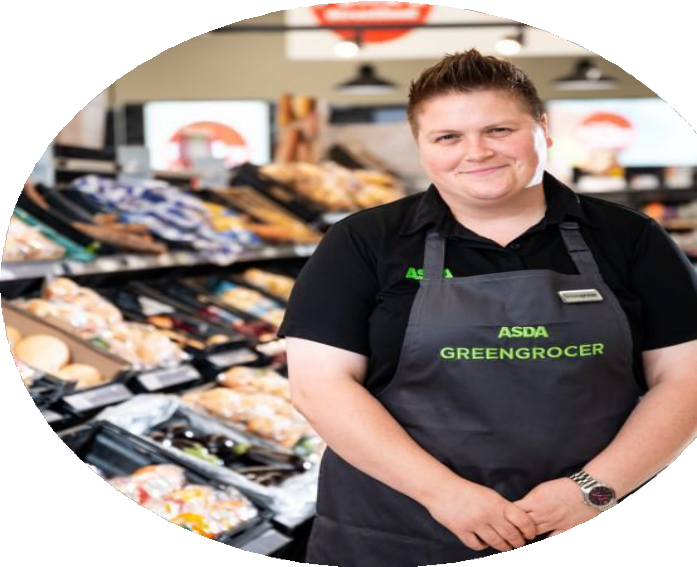
When Asda set their ambition to halve food waste, we searched the globe for a world-class solution. The result was WhyWaste, a solution which is now being deployed in every Asda store across the UK.
Background
One third of all food produced goes to landfill. As one of the UK’s major supermarkets, Asda are on a mission to reduce food waste by at least 50% by 2030. This ambitious target requires new tools, technologies and processes that empower store associates to take action and clear produce which is nearing expiry.
Solution
One third of all food produced goes to landfill. As one of the UK’s major supermarkets, Asda are on a mission to reduce food waste by at least 50% by 2030. This ambitious target requires new tools, technologies and processes that empower store associates to take action and clear produce which is nearing expiry.
Impact
Following an initial pilot in 2020, Asda is now deploying WhyWaste across their entire store footprint. “We have had great feedback from our stores and we are excited by the positive impact this new technology will have”, said Asda’s waste process manager Andrew Hudson. While
Asda-specific results are confidential, WhyWaste’s solution typically delivers a 90% reduction in food waste, while simultaneously saving store associates time and improving retailer margin.
Want to join our community of innovative sustainability leaders?
At Co:cubed, we’re building a network of innovative sustainability directors and leaders responsible for driving sustainability. We’ll meet once a quarter, share case studies, hear from keynote speakers and have the opportunity to network.Book a 30 min exploratory call to find out more
OUR CLIENTS
Trusted by 50 of the Fortune 100, and counting…
“Smart people, delivering great work. It’s been amazing.” – Antonio Bryant, Corporate Venturing, Vanguard
 Let’s co!
Let’s co!
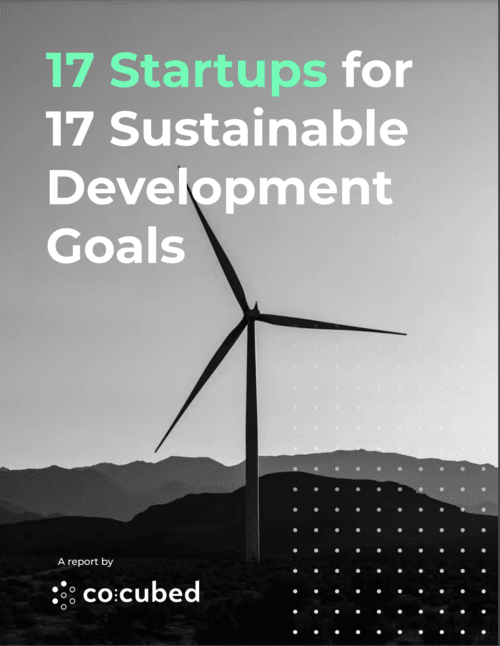
17 Startups for 17 Sustainable Goals
Startups are saving the world. Get a unique insight into 17 pioneering technologies and solutions for solving the world's biggest problems. Download it now to learn more and stay up-to-date on the latest developments.


